Wizards of the Coast seeks AI Engineer as they plan to ethically circumvent previous anti-AI commitment in their products

Wizards of the Coast is currently searching for a Principal AI Engineer that will build processes focused on simulation, asset creation, and AI generations. With WotC investing heavily in video games, this position seems centered on implementing AI processes in all levels of game development with a primarily responsibility being the generation of text dialog, audio effects, art assets, and NPC behavior and other work typically performed by undervalued human professionals.
Among these responsibilities, this position is charged with understanding the ethical ramifications of the AI in WotC products and being able to ensure ethics are part of the development process. Apparently this includes helping WotC ethically circumvent its performatively hollow pledge of refraining from using AI generated art in its products. The company promises:
We have been and will continue to be clear that we do not allow the use of generative AI in our art. While detection can be difficult and lines blurry, we are working hard to make sure our art is made by the talented humans who have delighted our fans for decades
That’s something the company only did after it was forced to admit it used AI in Dungeons & Dragons promotional material last August. This isn’t even the first time WotC has broken this pledge since it was made, as the company was already caught using “AI components” in Magic: The Gathering marking materials in January this year.
Semantically, this posting seems to focus on the realm video games and topically appears unrelated to Magic or Dungeons & Dragons. The problem is that this game development strategy focuses heavily on generative AI, which at its most basic concept, is a machine learning algorithm designed to generate text, audio, and visuals in response to a specific prompt. It’s creation in the loosest sense of the word because it relies on remixing content from massive data sets of previously existing text and images — including things like text descriptions of pictures, which is primarily an accessibility benefit — pulled from the internet or other sources.
Other sources could be something like a library of designs and product that spans 50+ years, potentially including the portfolios of the artists and designers caught in Wizards of the Coast’s 1,100 employee layoff before Christmas last year. Such a vast amount of content could provide near-limitless content rehashing without having to innovate, i.e., pay people for their work. And this isn’t idle speculation: it’s something that Hasbro CEO Chris Cocks has expressed interest in leveraging. In an interview with VentureBeat, he was eager to explain how much content the company could feed generative AI:
But when you talk about the richness of the lore and the depth of the brands–D&D has 50 years of content that we can mine. Literally thousands of adventures that we’ve created, probably tens of millions of words we own and can leverage. Magic: The Gathering has been around for 35 years, more than 15,000 cards we can use in something like that….
We can leverage all of that to be able to build very interesting and compelling use cases for AI that can bring our characters to life. We can build tools that aid in content creation for users or create really interesting gamified scenarios around them.
Despite Wizards of the Coast’s pledge, the writing is on the wall.
This job position seems crucial to a continued initiative of “creating” a product that relies on previously retained work with the bare minimum amount of real human input. Now instead of paying artists, writers, and game developers to create content and then firing them, the company can just remix its existing library, market it as new product, and cash out the shareholders directly.
This fits perfectly with generative AI use in the overall market. The technology has received incredible amounts of hype for what amounts to thinly veiled plagiarism, repackaging the work of real, passionate human beings without any need to pay creators — now or in the future.
AI isn’t paid a salary, doesn’t get health benefits, and isn’t liable to get sick, injured, or leave for a better situation. Right now we’re watching Hasbro build a team of AI developers to “mine” the company’s content for resale, while cutting out everyone involved in creating that content. The cost of AI is the livelihood of employees.
Everybody loses in this situation. AI is inherently incapable of creating original content: it generates an amalgam of what it was trained on. Companies using generative AI will shuffle the same old ideas around and present them in fresh packaging, with a higher purchase price. In a world of AI-generated games, we won’t see new ideas, innovative gameplay, or fresh art styles: we’ll only get the same old thing.
And that seems to be the future Hasbro and Wizards of the Coast are working towards.
Please consider supporting our Patreon!
Join the Discussion
Blizzard Watch is a safe space for all readers. By leaving comments on this site you agree to follow our commenting and community guidelines.




